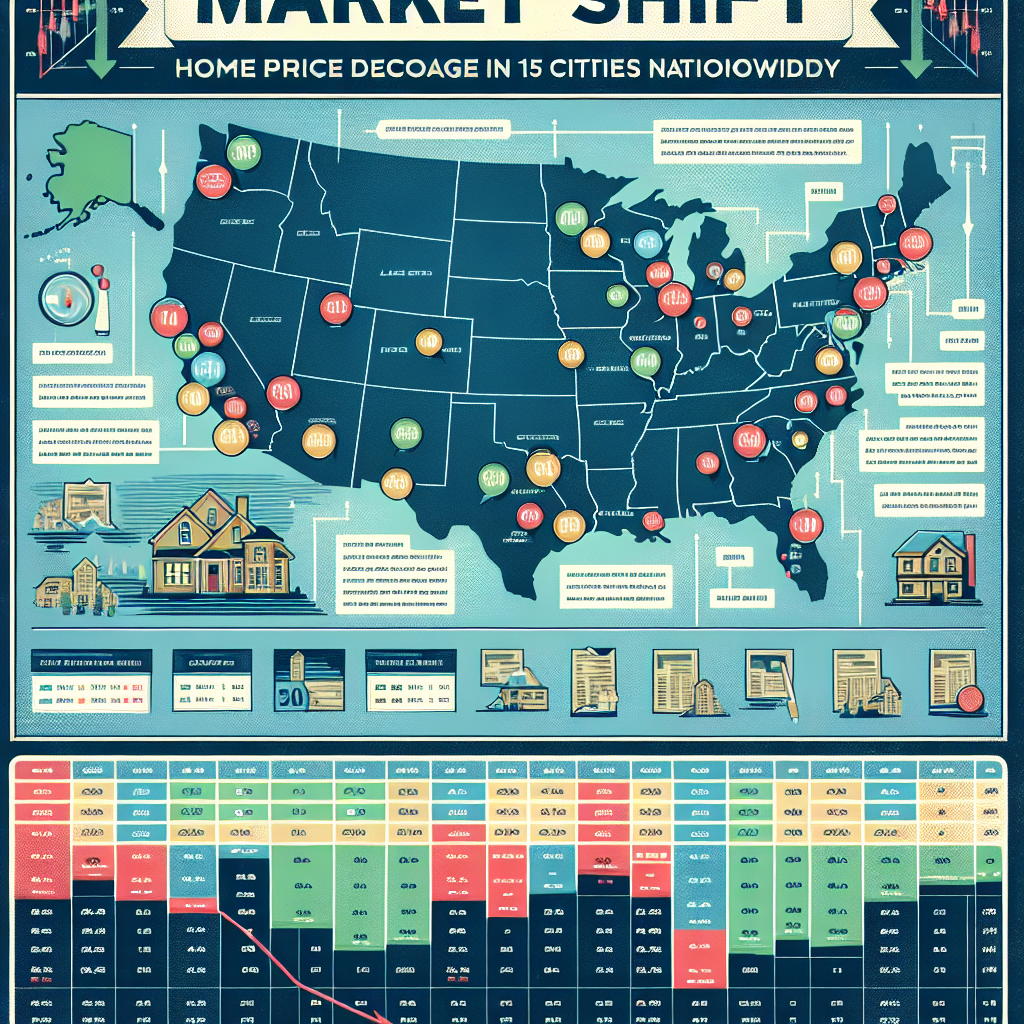-
Table of Contents
- Market Shift: Home Prices Decline in 15 Cities Nationwide
- Factors Contributing to the Decline in Home Prices
- Rising Interest Rates
- Economic Uncertainty
- Increased Housing Supply
- Case Studies: Cities Experiencing Declines
- San Francisco, California
- Austin, Texas
- Seattle, Washington
- Statistics and Trends
- Potential Long-Term Impacts
- Affordability Improvements
- Impact on Homeowners
- Economic Ripple Effects
- Strategies for Buyers and Sellers
- For Buyers
- For Sellers
- Conclusion
Market Shift: Home Prices Decline in 15 Cities Nationwide

The real estate market is experiencing a significant shift as home prices decline in 15 major cities across the United States. This trend is a stark contrast to the booming housing market seen in recent years, driven by low interest rates and high demand. In this article, we will explore the factors contributing to this decline, examine specific case studies, and analyze the potential long-term impacts on the housing market and economy.
Factors Contributing to the Decline in Home Prices
Several factors are contributing to the recent decline in home prices in these 15 cities. Understanding these factors is crucial for homeowners, potential buyers, and investors alike.
Rising Interest Rates
One of the primary drivers of the decline in home prices is the increase in interest rates. The Federal Reserve has raised interest rates multiple times over the past year to combat inflation. Higher interest rates make mortgages more expensive, reducing the purchasing power of potential homebuyers.
Economic Uncertainty
Economic uncertainty, driven by factors such as inflation, supply chain disruptions, and geopolitical tensions, has also played a role in the housing market shift. Potential buyers are more cautious about making significant financial commitments during uncertain times, leading to decreased demand for homes.
Increased Housing Supply
In some cities, an increase in housing supply has contributed to the decline in home prices. As new construction projects are completed and more homes become available on the market, the balance between supply and demand shifts, putting downward pressure on prices.
Case Studies: Cities Experiencing Declines
To better understand the impact of these factors, let’s examine specific case studies of cities where home prices have declined.
San Francisco, California
San Francisco has long been known for its high home prices, driven by a booming tech industry and limited housing supply. However, recent data shows a decline in home prices in the city. According to Zillow, the median home price in San Francisco dropped by 5% over the past year. The combination of rising interest rates and a shift towards remote work has led to decreased demand for housing in the city.
Austin, Texas
Austin experienced a housing boom during the pandemic, with many people relocating to the city for its lower cost of living and vibrant tech scene. However, the market has cooled in recent months. Redfin reports that the median home price in Austin decreased by 4% in the last year. The increase in housing supply and higher interest rates have contributed to this decline.
Seattle, Washington
Seattle’s housing market has also seen a decline in home prices. The median home price in Seattle fell by 3% over the past year, according to Realtor.com. The city’s tech industry remains strong, but rising interest rates and economic uncertainty have led to decreased demand for housing.
Statistics and Trends
To provide a comprehensive overview of the market shift, let’s look at some key statistics and trends from the 15 cities experiencing declines in home prices.
- San Francisco, CA: Median home price decreased by 5%.
- Austin, TX: Median home price decreased by 4%.
- Seattle, WA: Median home price decreased by 3%.
- New York, NY: Median home price decreased by 2.5%.
- Los Angeles, CA: Median home price decreased by 2%.
- Denver, CO: Median home price decreased by 1.8%.
- Boston, MA: Median home price decreased by 1.5%.
- Chicago, IL: Median home price decreased by 1.2%.
- Portland, OR: Median home price decreased by 1%.
- Miami, FL: Median home price decreased by 0.8%.
- Dallas, TX: Median home price decreased by 0.7%.
- San Diego, CA: Median home price decreased by 0.5%.
- Atlanta, GA: Median home price decreased by 0.3%.
- Philadelphia, PA: Median home price decreased by 0.2%.
- Houston, TX: Median home price decreased by 0.1%.
Potential Long-Term Impacts
The decline in home prices in these cities could have several long-term impacts on the housing market and the broader economy.
Affordability Improvements
One potential positive impact of declining home prices is improved affordability. As home prices decrease, more people may be able to enter the housing market, particularly first-time homebuyers who were previously priced out. This could lead to increased homeownership rates and a more balanced market.
Impact on Homeowners
For current homeowners, declining home prices can be concerning. Homeowners who purchased their homes at peak prices may find themselves with negative equity, meaning they owe more on their mortgage than their home is worth. This can limit their ability to sell or refinance their homes.
Economic Ripple Effects
The housing market is closely tied to the broader economy, and a decline in home prices can have ripple effects. Reduced home values can lead to decreased consumer spending, as homeowners feel less wealthy and may cut back on discretionary spending. Additionally, the construction industry may see a slowdown as demand for new homes decreases.
Strategies for Buyers and Sellers
In a shifting market, both buyers and sellers need to adapt their strategies to navigate the changing landscape.
For Buyers
- Take Advantage of Lower Prices: Buyers may find opportunities to purchase homes at lower prices than in recent years. However, it’s essential to consider the impact of higher interest rates on monthly mortgage payments.
- Negotiate: In a buyer’s market, there may be more room for negotiation on price and terms. Buyers should work with experienced real estate agents to secure the best deals.
- Be Patient: With economic uncertainty, it’s crucial for buyers to be patient and not rush into a purchase. Conduct thorough research and consider long-term financial stability before making a decision.
For Sellers
- Price Competitively: In a declining market, pricing a home competitively is essential to attract buyers. Overpricing can lead to extended time on the market and potential price reductions.
- Enhance Curb Appeal: Sellers should invest in improving their home’s curb appeal to make it stand out in a competitive market. Simple upgrades and staging can make a significant difference.
- Be Flexible: Flexibility in negotiations and terms can help sellers close deals more quickly. Consider offering incentives such as covering closing costs or providing home warranties.
Conclusion
The decline in home prices in 15 cities nationwide marks a significant shift in the real estate market. Rising interest rates, economic uncertainty, and increased housing supply are key factors contributing to this trend. While the decline presents challenges for current homeowners and the broader economy, it also offers opportunities for buyers to enter the market at more affordable prices.
As the market continues to evolve, both buyers and sellers must adapt their strategies to navigate the changing landscape. By understanding the factors driving the decline and staying informed about market trends, individuals can make informed decisions that align with their financial goals.
In summary, the current market shift underscores the importance of flexibility, patience, and strategic planning in real estate transactions. Whether you’re a buyer looking for a new home or a seller aiming to maximize your property’s value, staying informed and working with experienced professionals can help you navigate this dynamic market successfully.








